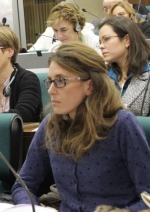For a women’s Policy: the missing voice is yours!
Project of Semistructured Interviews on Italian women’s needs concerning work and reconciliation, starting from a female point of view.
Why this project?
On March, 8th, on the occasion of the International Women’s Day, as every year, several Press Agencies and Newspapers published alarming data on female employment in Italy. These data show the complexity of a phenomenon which seems sadly unstoppable in our Country: figures on the pay gap between men and women, difficulty of conciliation between family and work, low average of female employment, especially after maternity leave, when it drops almost to zero .
To give just an example, hereafter are two extracts of articles from two Italian Newspapers “il Fatto Quotidiano” and “Ansa” published on March, 8th 2015.
Italian women “have a lower access to the labour market in comparison to the European average (Italian labour average is 46.6% and, after maternity leave, 1 in 4 women is out of work, especially after the birth of the second child” (il Fatto Quotidiano).
“ The wo rst po int is abo ut wo rk -family reconciliation policies. 23.3% of the interviewed women never used any reconciliation tool, only 36% have ever used maternity leaves while only 8% have applied for a part time work and 12.4% have requested parental leave.” (Ansa).
All this notwithstanding equal opportunities policies. Perhaps what is missing is a different idea of policies? Instead of trying to give ready made solutions, the idea is to ask women themselves why they leave work. Is it true that the problem is the lack of work or is there anything else? Could it be that, at some point in their lives, some women feel the need to take care of the family, not only of children but also of their husband and elderly parents or meaningful relationships? What if they decided to invest on family and relationship and not only on work? It does not matter how satisfying or remunerative their work could be, perhaps they finally realise that they cannot go on working without neglecting their deep desire and vocation: to do people blooming. How many women choose to quit their work or to refuse certain kind of positions because otherwise they would not be able to live their family life or to spend time enough with people they care?
If the goal is truly to allow more women to enter the labour market without any concerns, perhaps one should not start from general principles but from the women’s own desires and requirements. We should adopt a female approach: to begin from a personal and concrete perspective. So let’s start from real women and ask them what they would need.
Methodology and “listening attitude”
The aim of the project is to implement a semi-structured interview about women’s working needs, difficulties and reconciliation policies, where the interviewed women will have ample opportunity to describe the concrete solutions they would need to work, or to better work or to choose a more challenging job. This approach is inspired by the psychologist Carol Gilligan’s famous book, “In a different Voice” and by her studies on female ethics.
Carol Gilligan started from, and extended, Kohlberg’s studies and theory of moral development, which demonstrated that children progress through several growing stages of moral reasoning. Kohlberg found that the more abstract and highest stage, was reached more by men than women. Gilligan, that was a fellow researcher of Kohlberg's in the studies of moral reasoning , wanted to discover why. So she noticed that the research had been taught by male psychologists and that the questions had been based according to a masculine sample. In her own research she realized that, in moral decision making, women worked differently and placed a stronger emphasis on caring and empathy. A kind of morality based on concrete responsibilities and personal motivation rather than on abstract principles. The two kind of ethics (which she defined justice-based and care-based) are complementary to really let individuals grow up, and both of them need to be expressed. She claimed that, to really understand women’s point of view, interviews should be modified according to women’s way of expressing and living ethics. Hence the need to implement semi-structured interviews and develop a “listening attitude”.
The project: development and phases
DEVELOPMENT
The project is based on the set-up of a semi-structured interview on women’s need to reconcile family and work and on the reasons why they give up working.
The interview should be revised so that the resulting data may have a relevant statistical value. Beside questions granting a direct elaboration of data, the interview should leave women completely free to express their actual needs and the proposed solutions which could help them to freely make their own professional choices.
The results of these interviews could then be released in a short publication, structured not only to be read and interpreted in statistical terms but also resulting in free and proactive suggestions.
ADMINISTERING
The interview could be administered by an appointed team but also made available online on websites of Universities or Newspapers.
Besides, some Newspapers could launch the project in a monthly column, publishing one interview at a time, commented by a journalist.
Another possible action could be to involve women, actively involved in the project, to volunteer in administering the interview to their circle of relations, devoting some time to a ”woman to woman” deliberation.
DATA ANALYSIS AND PUBLICATION
The interview will be collected in a booklet (signed by all the women who will have contributed to the project) containing not only statistical data but also the most representative suggestions and considerations emerged.
POLITICAL AND CULTURAL ENVIROMENT
The data and the published booklet will then be passed on to the cultural environment and to relevant political bodies.
MONITORING CENTRE
If the project works, a monitoring centre could carry out an annual work of revision of the published data.


